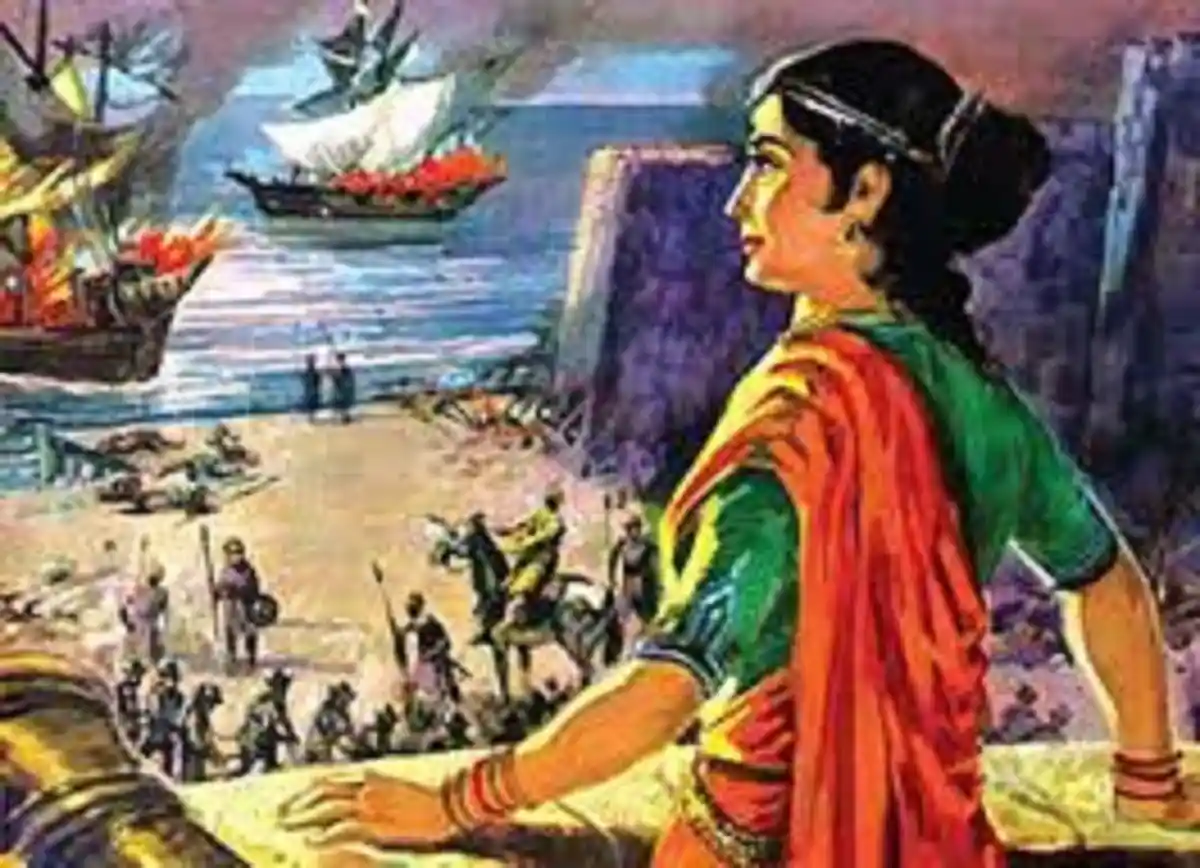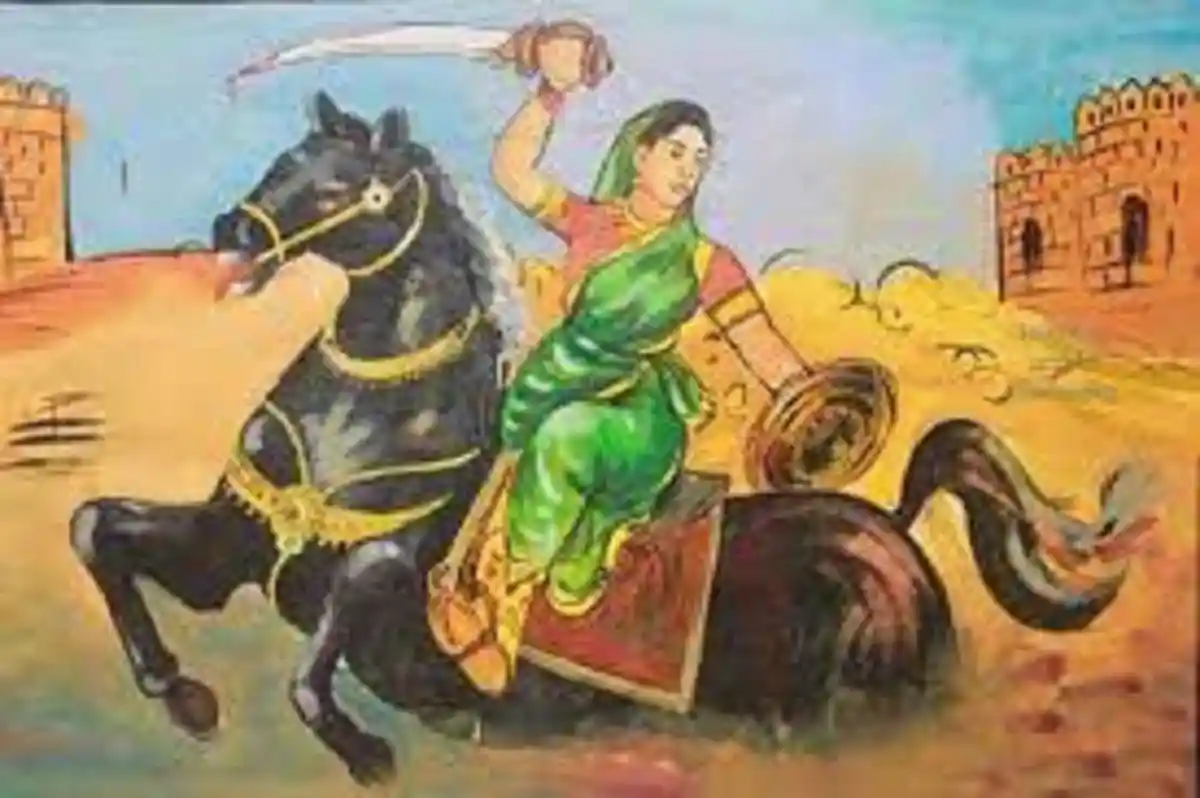Rani Abbakka: The Wall of the Portuguese
The history of Abbakka Rani, also known as Abbakka Mahadevi, can be found in the Arabian Seawater that reaches the coasts of Ullal near Mangalore in Karnataka. The first woman in history to face, fight and defeat the Portuguese on many occasions. Abbakka Rani's unwavering valour and fortitude are comparable to that of Jhansi's renowned Rani Lakshmi Bai, Rangel's Rani Rudramadevi, and Kitor's Rani Chanama. Even though Abbakka Rani was one of the first freedom fighters to resist foreign invaders and colonialism, nothing is known about her or her remarkable narrative in history.

The Queen of the Coast; Source:Amarchitrakatha
The year was 1498. Since the 7th century, maritime trade has flourished between the communities of India's western coast and the Arabian Peninsula, primarily in spices, textiles, and war horses. Several European powers have been attempting to establish a sea route to India to profit from this lucrative trade. Vasco de Gama arrived in Calicut in 1498 after a long voyage, making him the first European to discover the maritime route to India. Five years later, the
Portuguese built their first fort at Cochin (now Kochi). Following that, a ring of forts was built around the Indian Ocean, including Musket in India, Mozambique in Mozambique, Sri Lanka in Sri Lanka, Indonesia in Indonesia, and even Macau in China. This, combined with superior naval technology, places the Portuguese in command of allspice routes to India within 20 years of Vasco da Gama's momentous expedition.
Portuguese domination in the region lasted the whole 16th century, unchallenged by any other European force. India was only raised at the beginning of the 17th century by the Dutch, French, and British. The Indian Ocean was once a free trading zone for Indian, Arab, Persian, and African ships, but now required the acquisition of a Karthus permit from the Portuguese. The Portuguese naval might mean that they always triumphed over rebellious local rulers. Mangalore was conquered by the Portuguese in 1526.
Ullal, a bustling port town nestled between the Western Ghats and the Arabian Sea, was their next objective. Ullal was the Chauta ruler Tirumala Raya's capital. Because the Chautas were a matrilineal dynasty, Abbakka, the king's little niece, was the heir. Sword fighting, archery, cavalry, military strategy, diplomacy, and all other aspects of statecraft were taught to the fiercely independent Princess from an early age. Abbakka was well aware of the threat posed by the Portuguese presence on the coast when she was crowned queen of Ullal, and she was as determined to fight back with everything she had. Tirumala Raya had negotiated a strategic marriage alliance for Abbakka Rani with Mangalore's monarch, Lakshmappa Arasa, before his death. Abbakka, as ruler of Ullal, remained to live in her own home following her marriage, and the couple's three children joined her. The marriage, however, fell apart when Lakshmappa Arasa made a deal with the Portuguese.
The Portuguese had been attempting to extract tributes and taxes from Abbakka to protect Ullal's trade, which had prospered under Queen's competent administration. She refused to consent to the Portuguese because she was enraged and annoyed by their unreasonable demands. Despite Portuguese attacks, her ships continued to trade with the Arabs. People of different castes and religions served in her army and navy, from Mogaviras and Billavo archers to Mapula ormans.
The Portuguese, enraged by her bravado, began hitting Ullal regularly. The first combat took place in 1556, with Admiral Don Alvaro de Silveira commanding the Portuguese fleet, and ended in an uneasy peace. Two years later, with a stronger army, the Portuguese were able to sack the hamlet at Ullal to some extent. However, thanks to Rani Abbakka's military tactics and diplomatic diplomacy, she was able to push the Portuguese back once more with the help of Arabs and the Samudri of Korikot. However, in the following fight, the Portuguese army led by general Xiao Pixaro invaded Ullal and took the royal palace. Rani Abbakka, on the other hand, managed to flee before they could apprehend her. She raided the Portuguese in the dead with 200 loyal warriors, killing the general and 70 of his soldiers. The surviving Portuguese troops fled to their ships, terrified of the attack's intensity.
When the Portuguese became concerned about Rani Abbakka's growing fame influencing other monarchs, they turned to the treasury for repeated frontal documented labor. Any alliance with the divine queen is now forbidden, thanks to a series of laws. Under danger of having his capital burned, her husband Arasa of Mangalore was also warned against providing any aid to Ullal. Despite this, Rani Abbakka continued to disregard the Portuguese offers and threats.
The Portuguese chose to attack Ullal by sending Anthony D'Noronha, the Portuguese viceroy of Goa. In a surprise pre-dawn invasion in 1581, three thousand Portuguese infantry were reinforced by an Armada of warships and the crafty Ullal. Rani Abbakka was taken off guard when she returned from a visit to her family's temple. But she mounted her horse and charged into battle, leading her warriors on a ferocious counter-offensive. As she and her warriors fired flaming arrows at the
Portuguese ship, her piercing battle cry echoed through the winds: "Save the motherland, fight them on land and sea, fight them on the streets and the benches driven back to the oceans." Rani Abbakka was injured in the crossfire and kidnapped by the enemy with the help of a few bribed chiefs while many of the ships in the Portuguese Armada burnt that night. The fearless queen remained defiant until she died in captivity, but her memory lives on via her equally fierce and brave daughters, who continued to defend Tulunadu from the Portuguese.
A warrior queen who sacrificed her life in defence of her motherland and independence. Despite the Portuguese military superiority, Rani Abbakka maintained a prominent throne on the Portuguese side throughout her reign. This in itself demonstrates her bravery and cleverness, yet her remarkable narrative has been mostly forgotten by history books. The good news is that the legend of Ullal's legendary queen continues to live on in Dakshin-Kannada folklore. Her story has progressively gained public notice in recent years. For the past few years, Dakshin-Kannada has held the Veera Rani Abbakka Utsava, an annual celebration in her honor.

Abbakka’s valor fight against Portugese; Source: FeminismInInda


